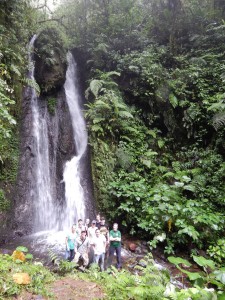
Westfield State’s Costa Rica study abroad group in front of a waterfall at the San Gerardo Field Station. (Photo submitted)
WESTFIELD– This winter, Westfield State University offered a J-Term course that sent fourteen students to Costa Rica in January to study the diverse ecosystems and organisms of the country.
Students that participated in the course experienced different types of forests and mangroves in Costa Rica as well as a variety of tropical organisms. The students learned about conservation issues such as tropical reforestation in Costa Rica.
The course was led by Dr. Tim Parshall, PhD., associate professor of biology and environmental science. This wasParshall’s fifth study abroad course.
“This is my fourth time to Costa Rica and I’ve taught one course in Belize,” Dr. Parshall said. “Every time you go abroad it’s an equally amazing experience, but there’s something different for you every time.”
The students’ main focus of study was the tropical ecosystems they traveled to throughout the course. The class visited the Tirimbina Rainforest, the Monteverde Cloud forest Reserve, and Manuel Antonio National Park.
Katie Boothe ’14, an environmental science major, enjoyed the variety of locations the course took them to.
“We began in the city of San Jose,then traveled to Tirimbina, Monteverde, San Gerardo Field Station, and ended in Tamarindo which is on the Pacific side of the country,” Boothe said. “While in Tamarindo we learned about many conservation issues: endangered sea turtle eggs, water usage, and mangrove declination.”
Forest conservation was a pivotal course objective for the study abroad class. Costa Rica has one of the highest deforestation rates in Central America and one of the lowest percentages of rainforests that are still intact. Some of the biggest efforts in Costa Rica are to reverse the negative and harmful effects that pollution and agricultural lifestyle have created in the country.
Dr. Parshall has some expertise in this field of forest conservation, particularly in Costa Rica.
“I work with a colleague from Costa Rica, Deborah Hamilton, and she works with a conservation group there,” Dr. Parshall said. “Basically, they plant trees in empty cow pastures in an attempt to reforest the plowed area and I evaluate the data to see how the tree is growing and if reforestation will be possible in that area.”
With Dr. Parshall’s knowledge on the topic and some first-hand experience, the students became aware of some of the serious conservation issues happening in Costa Rica.The students also studied many organisms thriving in the nature of Costa Rica. Both by exploring the forests and touring some of the biological field stations, the students witnessed those animals in their natural environments.
“I think one of the highlights of the trip was when the group watched an endangered Green Sea turtle come up onto one of the beaches and lay its eggs,” Dr. Parshall said. “We stayed there for hours just to watch the whole process of it.”
This study-abroad course, and others like it, fulfills both a biology lab requirement and a major requirement for biology and environmental science majors but the course is not limited to these majors.
“Any student can appreciate the beauty of another country,” Boothe said. “I can’t think of anyone who wouldn’t want to hike in the rainforest and experience the beauty. One day those forests might not be there anymore, so as many people as possible need to experience it.”
This study-abroad course and all international courses are handled by International Programs, located in the Parenzo Hall Lobby at Westfield State University. For more information on study-abroad opportunities, please contact International Programs at (413) 572-8819 or email them at [email protected]

